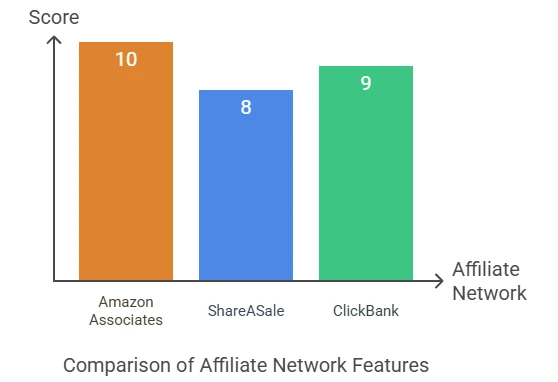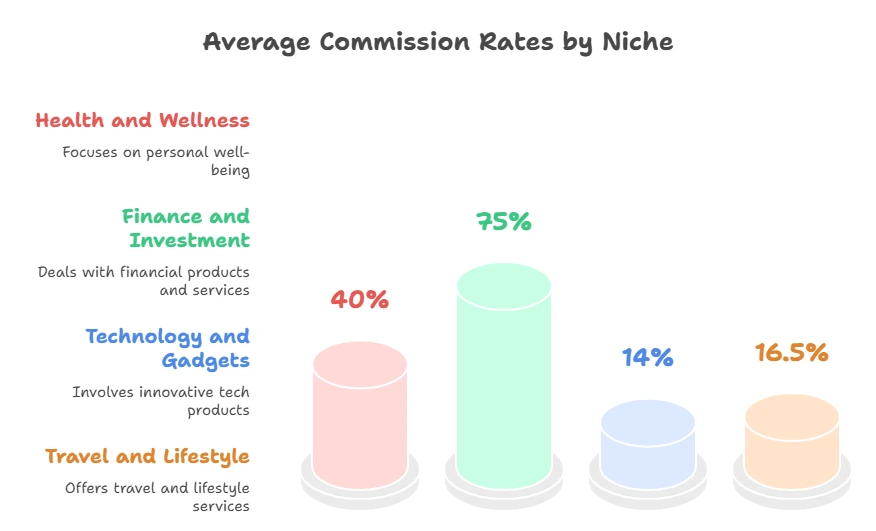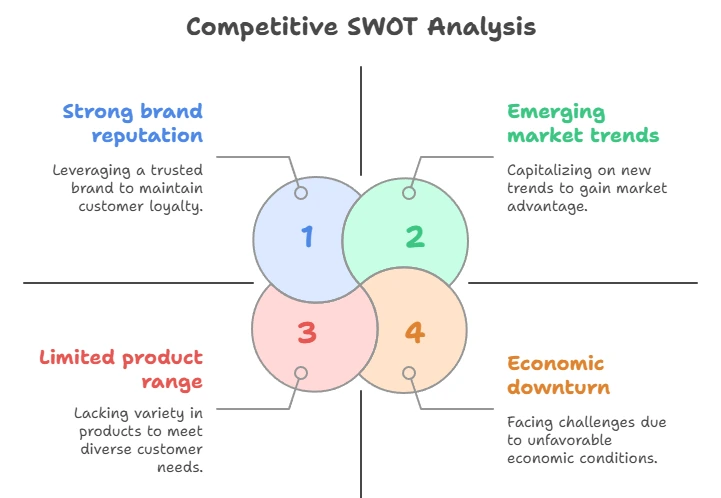
Choosing the right affiliate marketing niche is crucial for success. An ideal niche not only suits your interests and goals, but also provides ample opportunities for profit. To help you pick the best niche, consider these key factors.
Assess Your Interests and Expertise
First and foremost, think about what you enjoy. When you’re passionate about your niche, creating content feels less like work and more like fun. Identify your hobbies, interests, and areas where you have knowledge. This step not only keeps you engaged but also positions you as a credible authority.
Market Demand
Next, gauge the demand for the niche. Conduct thorough research to understand the target audience. Here are a few methods to assess market demand:
- Use tools like Google Trends to see trending topics.
- Explore affiliate networks like ClickBank for top-selling products.
- Check forums and social media groups to identify common problems and questions within your niche.
Competition Analysis
Another critical consideration is the competition within your chosen niche. A niche with too much competition can make it hard to stand out. Tools such as SEMrush and Ahrefs can help analyze competitors’ performance. Look for the following:
- Identify the number of competitors in your niche.
- Assess their strengths and weaknesses.
- Explore potential gaps in the market where you can provide unique value.
Profitability Potential
Always consider how much money you can make in your chosen niche. Research affiliate programs and their commission rates. Some niches may be popular, but the payout may not be worth the effort. Here are some profitable niches you might explore:
| Niche | Average Commission Rate |
|---|---|
| Health and Wellness | 30% – 50% |
| Finance and Investment | 60% – 90% |
| Technology and Gadgets | 8% – 20% |
| Travel and Lifestyle | 3% – 30% |
Longevity of the Niche
Choose a niche that has longevity and is not just a passing trend. This ensures that you won’t be scrambling for new content ideas every few months. Classic niches like health, finance, and self-improvement are usually stable. However, niche markets like cryptocurrency can be lucrative but may also carry risks due to their volatile nature.
Audience Engagement
Engagement is vital in affiliate marketing. Choose a niche where you can connect with your audience easily. Gather insights through surveys or discovery sessions to better understand their needs. Engaging content helps build trust, leading to increased conversions.
Test and Iterate
Once you’ve zeroed in on a potential niche, don’t hesitate to test it out. Launch your affiliate marketing campaigns and monitor performance closely. Look at metrics like conversion rates and audience feedback. If something isn’t working, be ready to pivot or adapt. Continuous testing can reveal insights that help improve your strategy.
Resources for Further Research
Effective research is essential in choosing a profitable affiliate marketing niche. Utilize online platforms such as:
- Ahrefs for SEO insights.
- SEMrush for competitor analysis.
- Jungle Scout for product research.
By considering your interests, analyzing market demands, understanding competition, and testing your niche ideas, you’ll be well-equipped to choose a profitable affiliate marketing niche. Remember, your goal is to help and engage your audience—this will ultimately drive your success.
The Importance of Market Research in Affiliate Marketing
In the dynamic world of affiliate marketing, success hinges on one key factor: market research. By understanding your niche, audience, and competitors, you can create targeted strategies that yield higher conversion rates. Ignoring this crucial element can lead to wasted time and resources. Therefore, grasping the significance of market research is essential for anyone looking to thrive in affiliate marketing.
Why Market Research Matters
First, let’s delve into why market research matters. Knowing your target audience is at the forefront of effective affiliate marketing. When you have a clear understanding of who your audience is, what they want, and their purchasing behaviors, you can select products that resonate with them. Higher relevance leads to more clicks and conversions. As you build your affiliate marketing strategy, you should focus on:
- Identifying your ideal customer’s demographics.
- Analyzing their interests and online behavior.
- Understanding their pain points and how your affiliate products can solve them.
Competitive Analysis
Secondly, competitive analysis is a vital component of market research. Knowing who your competitors are and what they are doing allows you to position yourself effectively. You can analyze their marketing strategies, the products they promote, and their engagement tactics. This knowledge will enable you to:
- Differentiate your offerings.
- Spot gaps in the market.
- Develop unique selling propositions (USPs) that draw customers to you instead of your competitors.
Keyword Analysis
Another crucial aspect of market research is keyword analysis. Keywords are the foundation of driving organic traffic to your affiliate marketing website. Using tools like Google Keyword Planner or Ahrefs helps you find terms your audience is searching for. By optimizing your content with these keywords, you increase visibility in search engines, making it easier for potential customers to find your products. Here are some key steps to conduct effective keyword research:
- List topics related to your niche.
- Use keyword tools to find search volume and competition.
- Select keywords that have a good balance of low competition and decent search volume.
Leveraging Social Media for Market Research
Furthermore, leveraging social media platforms for market research can provide invaluable insights. Platforms like Facebook, Instagram, and Twitter allow you to interact with your audience directly. Here’s what you can do:
- Create polls or surveys to gauge interest in specific products.
- Engage with followers to understand their needs and preferences.
- Monitor trending topics and discussions within your niche.
Staying Updated with Industry Trends
Beyond conventional market research, it’s essential to stay updated with industry trends. Websites like Affilorama or Digital Marketer frequently provide insights on changes within the affiliate marketing landscape. Being aware of these shifts enables you to adjust your strategies and stay ahead of the competition.
Surveying Your Audience
Another powerful method is surveying your existing audience or customer base. This step could involve sending out email newsletters with questions regarding their preferences or conducting interviews. Your customers can provide practical feedback that shapes your affiliate marketing approach. Here’s a quick way to conduct effective surveys:
- Ask open-ended questions to gather detailed insights.
- Utilize online tools like Google Forms for easy collection of responses.
- Offer incentives, such as discounts, to encourage participation.
Running Test Campaigns
Running test campaigns based on your market research findings can yield real-world results. Start small with split testing—using different content, calls to action, or products—to analyze what resonates most with your audience. Adjust according to the data collected, and refine your affiliate marketing strategies accordingly.
Conclusion on Market Research
Thorough market research is the backbone of successful affiliate marketing. By investing time in understanding your audience, analyzing competitors, conducting keyword research, utilizing social media insights, and continuously adapting to market trends, you position yourself for greater success in the affiliate marketing arena. Remember, informed decisions lead to profitable outcomes, and in the fast-paced digital world, being ahead means everything.
Identifying Your Passion and Expertise for Niche Selection
Choosing a profitable affiliate marketing niche is crucial for your success in the online space. One of the best ways to start is by identifying your passion and expertise. Not only will this keep you motivated, but it will also help you connect with your audience more effectively. Let’s explore how to pinpoint your interests and skills to find a niche that can bring you income.
Reflect on Your Interests
Begin by creating a list of topics that excite you. Ask yourself:
- What are your hobbies?
- What subjects do you enjoy reading about?
- What activities bring you joy and satisfaction?
Make sure to write everything down without filtering. This exercise should be broad to allow for creativity. After you have your list, narrow it down to the top five or ten areas that truly resonate with you.
Evaluate Your Skills
Next, consider what you do well. Your expertise can be an asset in your niche selection. Here are some questions to guide your evaluation:
- What skills have you developed over the years?
- Are there professional experiences that set you apart?
- What unique insights do you have that others might not?
You might find that your professional background aligns perfectly with your personal interests. For example, if you’re a fitness trainer, you could focus on health and wellness products. This combination of passion and expertise sets a solid foundation for your affiliate marketing efforts.
Research the Market
Once you have a better understanding of your interests and skills, it’s time to investigate potential niches. Use tools like Google Trends, SEMrush, and Ahrefs to analyze market demand. This will help you determine if people are actively searching for your niche topics. Consider the following metrics:
- Search Volume: Look for keywords that receive a substantial number of searches each month.
- Competition: Examine how many others are in the same niche. A lower competition level can make it easier to gain traction.
- Trends: Ensure that the niche you choose isn’t just a passing fad. You want a niche that can sustain interest over time.
Assess Affiliate Marketing Potential
After identifying a niche that aligns with your interests and shows potential market demand, assess its profitability through affiliate programs. Check platforms like ClickBank and Amazon Associates to see what products are available in your chosen niche. Look for the following:
- Commission Rates: Higher commissions can make your efforts more worthwhile.
- Product Quality: Promote products that you believe in and that your audience will appreciate.
- Market Size: A niche with a larger audience can yield more profit opportunities.
Test Your Ideas
Before fully committing to your chosen niche, consider launching a small blog or social media profile to gauge interest. Create quality content around your niche, and engage with your audience. This hands-on testing will provide insights into whether your niche resonates with potential customers.
Be Open to Refinement
Your chosen niche may evolve as you gain more experience and feedback from your audience. Stay flexible and be open to adjusting your approach. Success in affiliate marketing often comes from fine-tuning your strategies over time, so don’t hesitate to pivot if necessary.
Conclusion on Passion and Expertise
Identifying your passion and expertise is an essential step in choosing a profitable affiliate marketing niche. By reflecting on your interests, evaluating your skills, researching the market, and testing your ideas, you can set yourself up for success in the affiliate marketing space. Remember to stay adaptable, as your niche may change over time, reflecting both your growth and market shifts.
To delve deeper into affiliate marketing niches, check out resources at Niche Hacks for insightful advice and data. Happy niche hunting!
Analyzing Competition in Potential Affiliate Niches
Choosing the right affiliate marketing niche is crucial for your success. One key component in this decision-making process is analyzing the competition in potential niches. This will not only help you determine the viability of your niche but also guide your content strategy and promotional efforts.
A Systematic Approach to Competitive Analysis
When you begin your analysis, you should follow a systematic approach to identify the strengths and weaknesses of your competitors. This can involve both qualitative and quantitative analysis. Here’s how you can structure your competitive analysis:
Identify Your Competitors
The first step in your competitive analysis is to pinpoint who your main competitors are in the niche you’re considering. Use tools like SEMrush or Ahrefs to find out which websites are ranking high in your potential niche. Focus on:
- Top affiliate marketers in your niche
- Established brands and their online presence
- Emerging niche competitors who might disrupt the market
Analyze Their Content Strategy
Once you’ve identified your competitors, it’s essential to delve into the content they produce. Examine:
- The types of content they publish (blog posts, reviews, videos)
- The frequency of their content updates
- Engagement on their content (comments, shares, likes)
- The keywords they rank for and their use of SEO strategies
This analysis will provide insights into the topics that resonate with the audience and can help you pinpoint gaps in their content that you can exploit.
Assess Their Affiliate Offerings
Understanding what products or services your competitors are promoting will give you an edge. Look for:
- The types of affiliate programs they’re a part of
- The commission structures and payout settings
- Any unique offers or bonuses they provide to attract customers
By knowing what your competitors are doing, you can develop a unique value proposition. This could be offering better content, promoting different products, or establishing a more appealing brand image.
Evaluate Website Traffic and User Metrics
Quantitative data cannot be overlooked when analyzing competition. Use tools such as SimilarWeb or Google Analytics to assess:
- Total estimated traffic to competitors’ websites
- Traffic sources (organic, paid, social, etc.)
- Visitor engagement metrics (bounce rate, time on site)
Study Social Media Presence
Understanding how competitors interact with their audience on social platforms can also inform your strategy. Evaluate:
- The social channels they are active on
- Engagement levels (likes, shares, comments)
- The type of content they post and its effectiveness
Analyze which posts perform well and delve into the audience interactions to gain insights into trending topics within that niche.
Utilize SWOT Analysis
A SWOT analysis (Strengths, Weaknesses, Opportunities, Threats) can help distill the information gathered into actionable insights. This helps in observing where you can fill gaps and find opportunities. For example:
| Category | Details |
|---|---|
| Strengths | What do your competitors do well? |
| Weaknesses | What areas are they lacking in? |
| Opportunities | What customer needs are underrepresented? |
| Threats | What external factors could impact your competition? |
Conclusion on Competition Analysis
The key to a successful affiliate marketing venture is standing out in your chosen niche. By analyzing your competition thoroughly, you can carve out your unique position and build an affiliate marketing strategy that sets you apart. Embrace the competitive landscape as a chance to innovate and engage better with your audience.
For more comprehensive resources on affiliate marketing, consider visiting Affilorama or ClickBank for insights and tools that can enhance your strategy.
Strategies for Testing and Validating Your Chosen Niche
Choosing a profitable affiliate marketing niche is a significant step for any aspiring marketer. However, once you’ve made your choice, how can you be sure that it will yield results? Testing and validating your niche is essential to ensure that you’ve chosen a path that can lead you to success. Here are some effective strategies to do just that.
Market Research
Start with thorough market research to understand the current demands and trends within your niche. Use tools like Google Trends and Ahrefs to explore what topics are trending and if they have longevity. This gives you insights into seasonal trends as well.
- Identify Keywords: Look for keywords related to your niche. Aim for a mix of long-tail and short-tail keywords that people commonly search for. Utilize keyword planners like Google Keyword Planner.
- Analyze Competitors: Check who your competitors are. Use tools such as SEMrush to analyze their top-performing content and strategies.
Engage in Community Feedback
Join forums, social media groups, and online communities that center around your chosen niche. Platforms like Reddit and Quora can be useful for gauging what potential customers are discussing.
Ask questions and seek feedback on your ideas. This interaction not only provides validation but also deepens your understanding of your target audience.
Testing with Affiliate Programs
Before fully committing, consider joining a few affiliate programs related to your niche. This allows you to test product offerings without extensive initial investment. Use platforms like ShareASale or ClickBank to explore various products. Here’s how to maximize this strategy:
- Start Small: Pick a few products that align closely with your niche to promote. This makes it easier to track performance.
- Monitor Conversion Rates: Look for key metrics such as click-through rates (CTR) and conversion rates. Tools like Google Analytics can provide detailed insights.
- Focus on Audience Reaction: Engage with your audience to understand their reactions to the products. This can provide valuable insights into whether your niche can sustain long-term interest.
Content Creation and Observing Engagement
Create content targeted at your niche and observe how it performs. Whether it’s through a blog, videos, or social media posts, analytics can help track user engagement. Here are a few suggestions:
- SEO Optimization: Use SEO strategies to attract organic traffic. Employ the keywords identified during your market research.
- Analyze Engagement: Look at metrics such as page views, shares, and comments. This will help you gauge how well your content resonates with your audience.
Evaluate Affiliate Network Performance
After you’ve tested various products, it’s essential to evaluate the performance of different affiliate networks. Certain networks specialize in specific niches, which can affect your earnings potential. Use the following factors to measure their effectiveness:
| Network Name | Commission Rate | Popularity | Ease of Use |
|---|---|---|---|
| Amazon Associates | 1% – 10% | Very High | Easy |
| ShareASale | 5% – 50% | High | Moderate |
| ClickBank | 50% – 75% | High | Easy |

After evaluating these factors, you can make informed decisions about which networks to focus on based on the performance of your niche.
Conclusion
Selecting a profitable affiliate marketing niche is a journey that combines careful consideration of various factors. By understanding the key considerations—such as market demand, profitability potential, and aligning your niche with your personal interests—you’re setting a solid foundation for your success. Market research plays a crucial role in this process; it allows you to uncover trends, consumer needs, and potential gaps that your affiliate marketing efforts can fill.
Equally important is identifying your passion and expertise. When you choose a niche that resonates with your interests and skills, you not only boost your motivation but also establish yourself as an authentic voice in that space. Authenticity is key in building trust with your audience, which ultimately leads to conversions.
Analyzing the competition in your potential niches is another vital step. While competition can be daunting, understanding what others are doing can help you carve out your unique angle. By differentiating yourself, you can attract a devoted following that appreciates your insights and recommendations.
Testing and validating your chosen niche is essential for mitigating risks. Whether through trial campaigns, content testing, or audience feedback, each step helps you refine your approach and ensures that you’re moving in a profitable direction.
The combination of these strategies equips you for success in the world of affiliate marketing. With thorough research, self-awareness, and strategic analysis, you can confidently choose a niche that not only has the potential for profitability but also aligns with your unique strengths and interests. Your journey in affiliate marketing can be not only lucrative but also genuinely rewarding.



